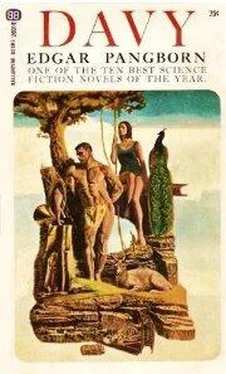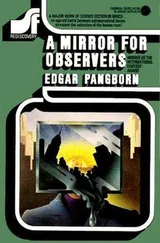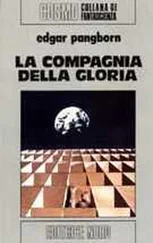“I dunno,” said Jed. “It don’t seem just right.”
“A manner of speaking, Jackson. Besides, I didn’t mean them hightoned Loomises from Kanhar was aristocrats — just a solid freeman family with a few Misters. Like my own Uncle Jeshurun — Kanhar Town Council give him a Mister, and why? Account the taxes he paid on the old brewery is why, the way it was in the family couple-three generations—”
“Wine is a mocker,” said Jed. “I don’t want you should go imagining things like breweries.”
“Damn-gabble it, man,” Sam said, “I’m merely telling you what they done, no use telling a story like this’n if it don’t sound like facts. I didn’t start the durn brewery, more b’ token if you ever hear tell of making wine in a brewery I want to know. It was great-gran’ther sta’ted it, understand, and she run along like a beaut till my Uncle Jeshurun, him with the wooden leg, took to drinking up the profits.”
Jed studied away at it, not happy.
“You mean he done that too in a manner of speaking?”
“He sure as hell did.”
“I mean, it just don’t seem to me, Sam, that people are going to believe it. About drinking up a whole brewery. He couldn’t do it.”
“I can see you didn’t know my Uncle Jeshurun. Leg was hollow, Jackson. Old sumbitch’d fill it up at the brewery after a long drunken work-day, take it home and get plastered, carry on like crazy all night long. He didn’t just die neither, not my Uncle Jeshurun. He blowed. Leanin’ over to blow out a candle, forgot whichaway to blow being drunk at the time, or rather he was never sober. Breathed in ’stead of out, all that alcohol in him went whoom — Jesus and Abraham, Mister, not enough left of the old pot-walloper to swear by. Piece of his old wooden leg come down into a cow pasture a mile away. Killed a calf. My Aunt Clotilda said it was a judgment — onto my uncle, I mean. Still, if it hadn’t happened he znight’ve had to leave town.”
We started the day after the clothes were finished; we may all have been afraid of coming to like that cave too much. At least Sam and I felt — without ever saying so — that we would always be in some way on the move; and for Jed and Vilet the farm in Vairmant colored the future with the warmth of a lamp.
It’s odd how little thought we gave the war, after being out of touch with the world more than three months. We wondered, and made some idle talk of it, but until we were on the move again, and the days were flowing out of June into the golden immensity of midsummer, we felt no urgent need to learn what the armies had done while we were so much at peace. They could have passed and repassed on the Northeast Road, Skoar could have fallen, we’d never have known it.
The border wars of that time and place were a far cry from what I saw and experienced of war later on in Nuin. In the Moha-Katskil war of 317 I don’t suppose there were ever more than two thousand men involved in a battle: mostly feinting and maneuvering, armies shoving for position along the few important roads, avoiding the wilderness as much as they could; the forest ambush those Katskil men tried outside Skoar was unusual. As it happened, I saw no more of that particular war. It was settled by negotiation in September. Katskil ceded a trilling port and a few square miles of ground on the Hudson Sea in return for the town of Seneca and a thirty-mile strip of territory that gave them a long-desired access to the Ontara Sea. Brian VI of Katskil had other smart reasons for demanding those treaty terms — I didn’t appreciate this until long later, when I was with Dion in Nuin and getting my own inside view of high-level politics. That thirty-mile strip cut off Moha from any land approach to the western wilderness; so if that unknown, probably rich region is ever tapped by land routes it will be a matter between Katskil and Penn — Moha needn’t bother.
When we left our cave I was concerned with the more ancient war of human beings against other creatures who desire to hold a place on earth. I felt, superstitiously, that we had been having it too easy. In our hunting and fishing while we stayed at the cave we’d encountered nothing more dangerous than a few snakes. Once a puma started out of the brush ahead of Vilet and me and took off in almost comic terror. One night we smelled a bear, who might have got troublesome if he could have climbed after our supplies. It was only a black of course, as we knew from the prints we found in the morning. The great red bear is so scarce in southern Moha one never really expects to see him. North of Moha Water he is plentiful enough, one of the chief reasons why that great triangle of mountain country bounded by Moha Water and the Lorenta Sea remains mostly unexplored.
I find it strange, in reading Old-Time books, to notice what unconcern the people of that age felt about wild beasts, who were scarce and timid then, overwhelmed by human power and crowding and incredible weapons. Man in that time truly seemed to be master of the earth. In our day, a few hundred years later, I suppose he’s still the most intelligent animal at large, even still likely to succeed if he ever learns how to quit cutting his brother’s throat, but he is under a slight cloud. We might become masters of the world again, but perhaps we ought to watch out for a certain cleverness I’ve noticed in the forepaws of rats and mice and squirrels. If they’d develop speech and start using a few easy tools, say knives and clubs, it wouldn’t be long before they were explaining the will of God and rigging elections.
Gunpowder is forbidden by law and religion, [16] The prohibition appears thus in the Book of Universal Law, 19th edition (the latest I believe) published at Nuber in 322: “It is and shall be utterly and forever forbidden on pain of death by whatever method the Ecclesiastical Court of the district shall decide, to manufacture, describe, discuss, create any written reference to, or in any manner whatsoever make use of the substance vulgarly known as Gunpowder, or any other substance that may by competent authorities of the Church be reasonably suspected of containing atoms.” — Dion M. M.
and this may be just as well, since guns to make use of it are forbidden also by lack of steel, lack of a technology capable of designing and making them, and nowadays by a lack of belief that such instruments ever existed. Since a vast amount of fiction was produced in Old Time, it is wonderful how the Church today can explain away anything unwelcome in the surviving fragments of the old literature by calling it fiction.
We had to remember that some bandit gangs were said to roam the wilderness, though eastern Moha did not have too bad a reputation that way — southern Katskil is lousy with them. Such outlaw gangs care nothing for laws or national boundaries; they live off the wilderness, and now and then take a toll from the villagers. Hardy souls — they kill off their old people, rumor says, and admit new members only after savage ordeals. The gangs are small — in Moha or Nuin you never hear of one attacking a town of any importance, or a large caravan, [17] Any group of travelers who follow the roads and keep together for safety is called a caravan. The word seems to have been used a little differently in Old Time. — Dion M. M.
even for hit-and-run raids. The Cod Islands pirates are popularly supposed to have started from a bandit gang that got clever with small war vessels and then almost grew into a nation. In Conicut I heard the tale of a whole army battalion routed by a couple of dozen bandits who decided the soldiers were encroaching. The story was set in the rather distant past; the begging street-corner storytellers preferred a version in which the bandits had trained teams of black wolves to help them, under the command of a most unusual character named Robin or Robert Hoode.
Читать дальше












